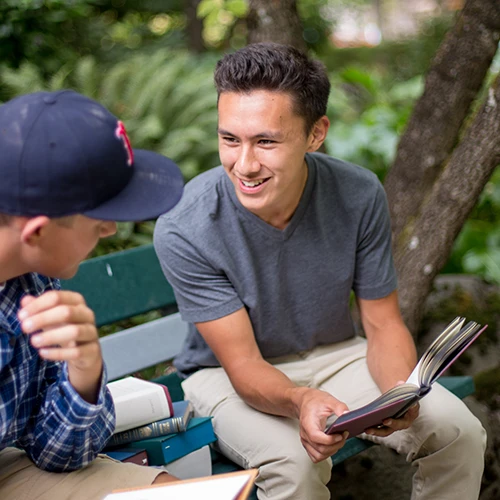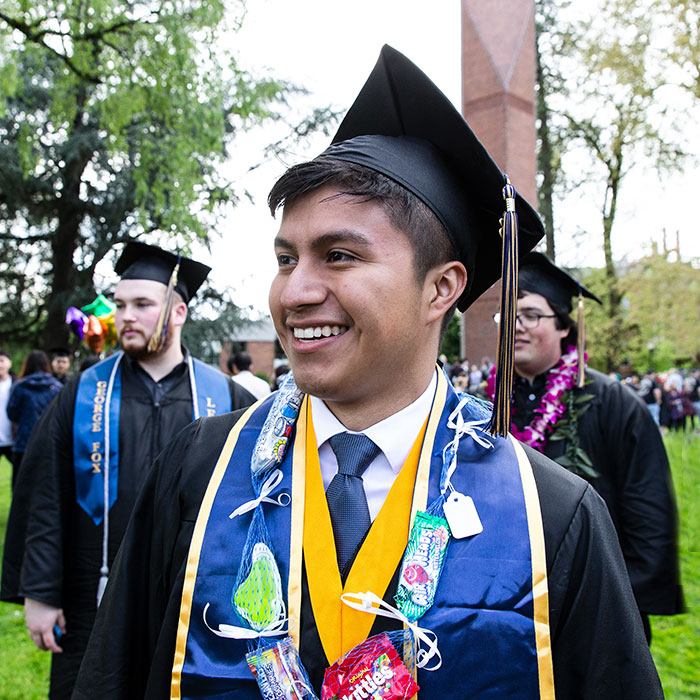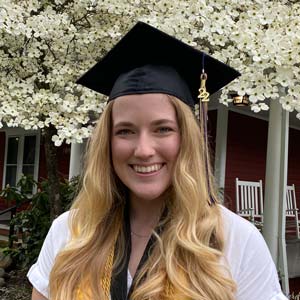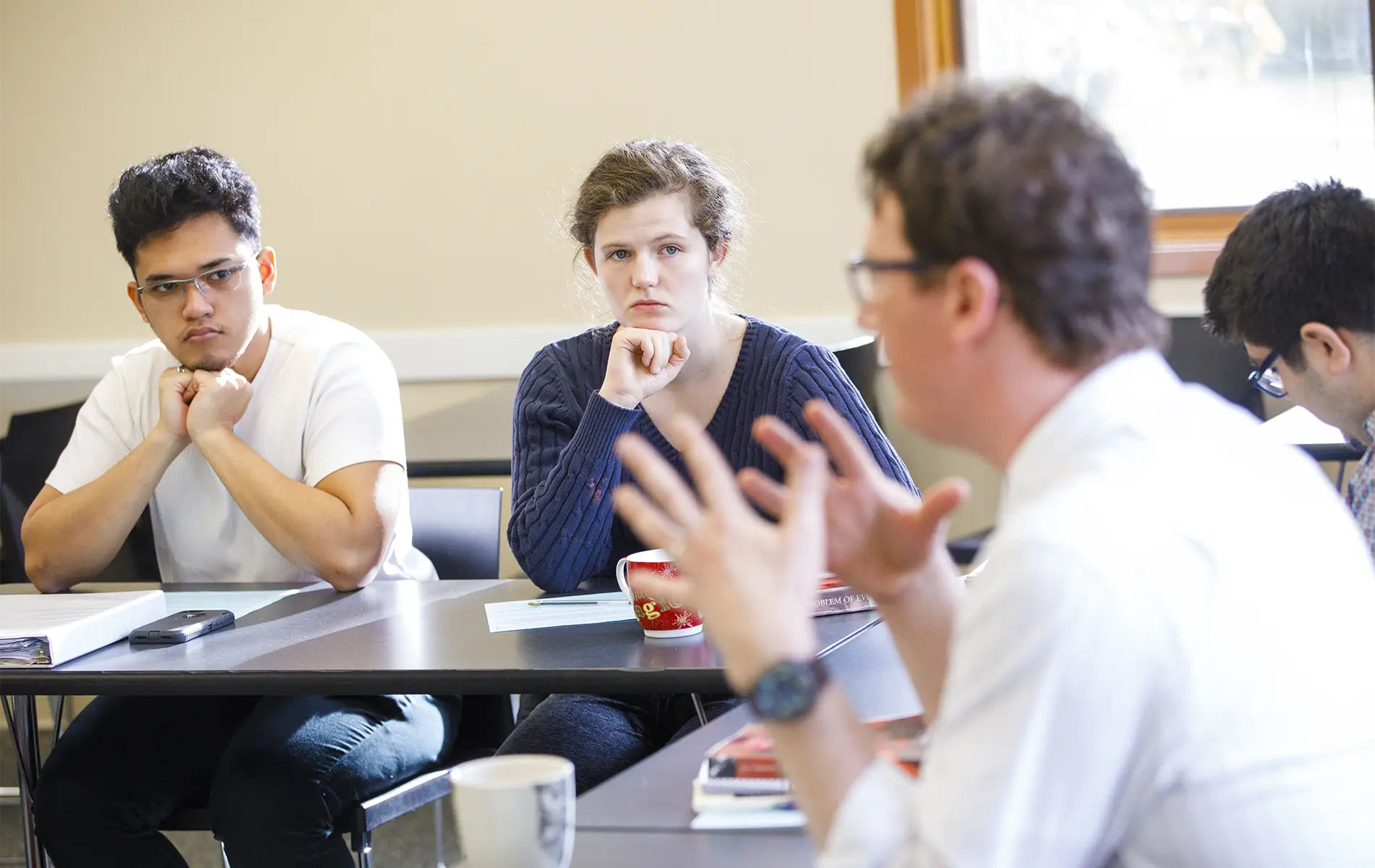At A Glance
Program Type
Bachelor of Arts (BA)
Accreditation
Northwest Commission on Colleges and Universities (NWCCU)
Biblical Studies, Christian Ministries, Philosophy
Graduate Program
George Fox University’s Portland Seminary offers multiple masters programs for further study and training

A Study of God and the Things of God
At all times and places, the need for agents of grace and reconciliation is great. How will you be used by God to bring hope, joy and healing to the places he has called you? Let us help you answer the call!
Theology is broadly defined as “the study of God and the things of God.” At George Fox, that study is about more than mere knowledge because the theological task always involves a transformed heart. Put differently, at George Fox you’ll seek understanding with faith, and all aspects of who you are – heart, mind, soul and strength – will be challenged and changed.
As a theology student at George Fox, you will be mentored by faculty mentors who know you by name and are invested in your future. You will have the chance to participate in a rich community of study, worship and spiritual discipline. Ultimately, our goal is to equip you to better serve both the church and the greater world, no matter where the Lord leads you.
Concentrations
As part of the major, we offer three concentrations:
Biblical Studies
In the biblical studies concentration, you will dive deeper into Scripture – into its original languages, its historical contexts and its theological interpretation – and learn how it applies to contemporary life today as a pastor, teacher or scholar.
This course of study will provide you with a solid foundation for a teaching the Bible in a church or school setting, or for pursuing graduate work in Bible and theology.
Christian Ministries
In the Christian ministries concentration, you will learn practical ways to serve the church – in everything from global missions to youth ministry – and be equipped with the basic tools of counseling, budgeting and church administration.
This course of study will holistically prepare you to serve the local church, global church or in youth ministry, with special attention given to discipleship, formation, preaching, creativity and service. Interested in being a pastor, missionary, youth pastor or Christian educator? This is the program for you!
Philosophy
In the philosophy concentration you will journey deep into logic, ethics, metaphysics, epistemology, and apologetics, and be formed as a Christian thought leader, prepared for service to the church and society.
This course of study shapes you to live an examined life cultivating moral and intellectual virtue informed by the Christian faith. Graduates in philosophy have careers in many areas, most commonly in ministry, law, education, management, medicine, and software development. You can also chose to study Philosophy and Apologetics as a minor.
Program Distinctives Why Study Theology at George Fox?
-
Theology is a vibrant, living conversation with God and God's people, and with immediate implications for how we live here and now.
-
We want you to be the best theologian you can be, no matter where the Lord leads, so we designed our major to be as full and flexible as possible, enabling you to add another major or minor of study.
-
You will master the art of reading, discussing, interpreting, writing and speaking about core texts, ideas and issues at the heart of our Christian faith.
-
The core skills we teach are transferable into any sector of professional life and provide a distinct advantage for those who go on to careers in related fields such as law, journalism, politics, education or nonprofit leadership.
Courses / Curriculum What Will I Study?
Career Outlook What’s After George Fox
Our graduates have gone on to careers in ministry, business, theater/acting, social work, nonprofit leadership, law school, marketing, nursing and graduate degrees at all levels around the world.
Data shows that those majoring in topics like religion, ancient languages and history, and philosophy rank near the top of test scores on the LSAT as well as the GRE. Courses within our department specialize in the exact skills that are now ranked as the most desirable for companies hiring new employees, such as problem solving, processing complex information, verbal and written communication, teamwork, and the ability to influence others.
- Night Ministry, Portland Rescue Mission
- Nurse, Sisters of Providence
- Youth Minister, 2nd Street Community Church
- Lead Strategist, Nike
- Dentist, La Clinica
- Translator, Wycliffe Bible Translators
- Chaplain, United States Air Force
- Adjunct Professor, University of Notre Dame
- Missionary in Indonesia, Wycliffe Bible Translators
- Principal, Newman Catholic Middle/High School
- English Teacher in Rwanda, Rwanda Yearly Meeting of Friends
- Red Hills Church
- Northside Community Church
- Church on the Hill
- National Parks (Denver, Colorado)
- Youth Dynamics
- Mission Year
- 2nd Street Community Church
- Love, INC
- Friendsview Retirement Community
- Minuteman Community Education
- Catholic Community Services
- Princeton Theological Seminary (M.Div)
- Yale Divinity School (M.A.R.)
- Yale Institute of Sacred Music (M.A.R.)
- Emory University (M.T.S.)
- Duke Divinity School (M.T.S.)
- Fuller Theological Seminary (M.A./M.Div.)
- Portland Seminary (M.Div/M.A.T.S.)
- Trinity Evangelical Divinity School (M.Div.)
- Western Seminary (M.Div.)
- Oxford University (M.A.)
- University of Edinburgh (M.A.)
- Regent College (M.A./M.Div.)

Grad’s passion for racial reconciliation is changing lives in Philadelphia
If there’s ever the temptation to get discouraged and give in – to let all the brokenness and heartbreak around him derail the work at hand – Jael K.D.L.V. Chambers doesn’t let on. He can’t afford to. The need is too great, the stakes too high.
As associate regional director for Young Life in Philadelphia, Chambers sees it all: the fatherless homes, the desperation of “the hood,” the palpable racial and political tension in the city. And yet, he remains unfazed. He’s witnessed too many instances of restoration and reconciliation to lose hope now.

Abigail O’Grattan
As a biblical studies major and a student in the honors program, my faith in Scripture, in God’s goodness, and in the reality of the Kingdom have been challenged in more ways than I can count. This is the first place I recognized that my identity doesn’t come from my academic success. I don't have to work to prove my worth to anyone, and I am not defined by what I’m doing, but who I’m doing it for.
Chat with a current student
Hobbies & Interests: #Music, # Reading, #Skiing, #Guitar, Bluegrass Music
About Me: Hey! My name is Abby, and I am a sophomore here at Fox. I'm from a tiny town in Southwest Montana, but moving to Oregon has been a wonderful...Read more
Ask Me About: Performing Arts
“What’s your favorite class?”
“What’s the best student event?”
Request Information About Theology
